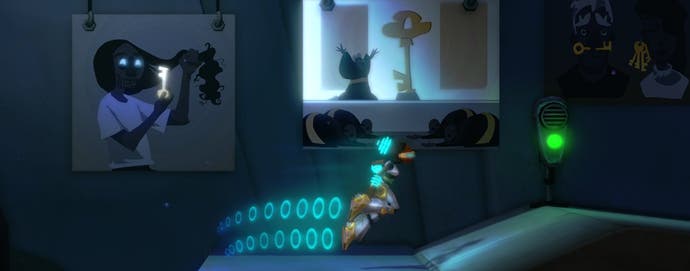Ron Gilbert on why he left Double Fine
"In some ways I've always been a little bit of a nomad."
When Monkey Island and The Cave creator Ron Gilbert announced his departure from Double Fine last night it surprised a lot of people. After all, Double Fine is a fan-favourite company where he got to work with his long time buddy and colleague Tim Schafer. So why leave?
I caught up with Gilbert this morning to discuss his departure and what's next for the prolific comedy creator. As it turns out, his reason for leaving wasn't particularly scandalous, but was rather pre-ordained. This was a temporary arrangement from the get-go.
"It wasn't 'Hey, come to Double Fine.' It was 'Come to Double Fine and make The Cave,'" Gilbert explained. "I was telling him [Tim Schafer] about The Cave and he really liked it, so he said 'come to Double Fine and make it. It was really all about making that game."
Gilbert said his departure is "not a big surprise to either of us. It was always in the back of our heads."

"In some ways I've always been a little bit of a nomad."
Ron Gilbert
He noted that The Cave was actually an idea he'd been kicking around since before his time at LucasFilm. "I would think about it every couple of years or so and I happened to be thinking about it at the time Tim and I were just hanging out."
That this was a partnership specifically built around The Cave surprised me as when I spoke to Gilbert last May at The Cave's unveiling he said that the game had been in development for a year, when in fact he'd been at Double Fine for a year and a half. When asked about this then he joked that he was "just f***ing around" those first six months, but given his arrangement I pressed for more details.
"Mainly we were just pitching The Cave to publishers. It took about six months to find a publisher for the game [which ended up being Sega]. I was kind of fleshing out the design and starting to work through details."
But why just make The Cave? Why not stay later? "I don't know why it was temporary," Gilbert said. "We didn't talk necessarily about what I would be doing after The Cave. I was so focused on that. And I tend not to think about a lot of that stuff. So then when it was done we just kind of decided that it was done. No big thing happened."
Unsatisfied with this answer, I pressed further on why he'd want to give up the job security at a proven developer that he had a solid working relationship with. "I think in some ways I've always been a little bit of a nomad," Gilbert replied. "I like moving around. I like trying different things... I love being independent. I've always been independent. After I left LucasFilm I started Humongous Entertainment, which was my company. I just like doing independent stuff. After Humongous Entertainment, Clayton [Kauzlaric, DeathSpank co-creator] and I did casual games together because that's kind of fun and I've always just enjoyed the life of a more independent developer."
"I would love to do something again with Double Fine."
Ron Gilbert
Yet this disbanding is more of a "see ya later" than "goodbye" as Gilbert noted he could always collaborate with Double Fine again. "I would love to do something again with Double Fine," he said. "They were a wonderful group of people to work with. Super smart and super talented, and doing something down the road with them would be a fun idea. If that opportunity ever came up again I think it would be fun to do."
Ultimately, Gilbert went his own way partially due to his love of working in small teams, as in smaller than his colleagues at Double Fine. "I've always liked small teams," he said. "There's just something about this very small group of people. You kind of become this one brain and everybody just knows everything that's going on and you're all just completely thinking along the same lines. And I've always found that very energizing."

"I've always liked small teams."
Ron Gilbert
This micro-team dynamic has drawn Gilbert to mobile development. "I really love the mobile game space quite a bit. I think it's a very vibrant and very dynamic space right now," he stated. "And I think one of the reasons is because you can have these very small development teams working on stuff. They don't take hundreds of people or even twenty people to put stuff together. You can get these very small teams of people to put stuff together and that's really interesting to me. That's really how I started out in this business, working on very, very small projects. Maniac Mansion was basically three people. It was me and Gary Winnick and David Fox and that was it."
Thus, Gilbert's next project is an iOS game entitled Scurvy Scallywags in The Voyage to Discover the Ultimate Sea Shanty: A Musical Match-3 Pirate RPG. Working with his DeathSpank co-creator Clayton Kauzlaric, Scurvy Scallywags is a comedy about a group of pirates off to the discover the titular "ultimate sea shanty." You'll uncover different verses as you go that will culminate in one giant song in the end.
Gilbert described Scurvy Scallywags as "in the same lines as something like Puzzle Quest," wherein combat transpires over a match-three mechanic. Though unlike Puzzle Quest, you'll be able to slide the tiles horizontally and vertically all across the board. "In Puzzle Quest you were matching pieces to charge up different spells, but in this it's really about moving pieces around the board," Gilbert noted.
He said Scurvy Scallywags is being developed for iOS because he loves programming in Objective C, but the game could later be ported onto other platforms. "I think if the game is successful then porting it over to Android and other platforms is definitely something we'd be interested in," he stated.
Scurvy Scallywags has already been in development for a few months and Gilbert said it's due "in the next one-to-two months."

